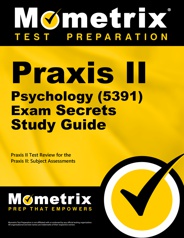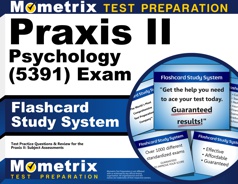The Praxis Psychology exam is designed to measure the knowledge and skills that are essential for professional psychology teachers.
Click “Start Test” above to take a free Praxis Psychology practice test, and check out our premium-quality Praxis test prep resources by clicking the links below!
Praxis Psychology Exam Outline
The Praxis Psychology exam contains 120 selected-response questions, and you will be given a time limit of 2 hours.
The exam is split into six content categories, which are designed to cover the various competencies and points of knowledge that a teacher should possess.
I. Methods, Approaches, Ethics, and Assessment (20 questions)
The questions in this category assess your knowledge and abilities in the following areas:
- Contemporary approaches to the study of psychology
- Major psychological subfields and careers
- Key historical figures in the study of psychology
- Basic psychological research principles
- Appropriate research methods
- Basic statistical concepts
- Ethical issues in research with humans and animals
- Basic principles of assessment
- Ethical issues relevant to psychological assessment
II. Biopsychology, Sensation and Perception, and States of Consciousness (19 questions)
The questions in this category assess your knowledge and abilities in the following areas:
- Basic neuronal structures and functions
- Organization of the nervous system
- Organization and basic functions of brain structures
- Clinical and technological methods for studying the brain
- The structure and function of the endocrine system
- The influence of heredity, evolution, and environment on behavior
- Basic sensory concepts and processes
- Perceptual concepts and processes
- Basic concepts of consciousness
- Basic characteristics and theories of sleeping and dreaming
- Major categories of psychoactive drugs and their effects
III. Life Span Development and Individual Differences (15 questions)
The questions in this category assess your knowledge and abilities in the following areas:
- Major themes in development
- Basic principles and theories of perceptual, physical, and sensory development
- Basic principles and theories of cognitive and linguistic development
- Principles and theories of emotional, moral, and social development
- Heredity and environmental factors that interact in the process of development
- Historical and contemporary theories of intelligence
- Common intelligence tests
- Limitations of intelligence testing
IV. Learning, Memory, and Cognition (19 questions)
The questions in this category assess your knowledge and abilities in the following areas:
- Basic principles of learning
- Principles of classical conditioning
- Principles of operant conditioning
- The roles of cognition and culture in learning
- Principles of social learning
- Basic processes of memory
- Characteristics of memory
- The biological bases of memory
- Methods for improving memory
- The concept of constructive memory
- The formation of concepts
- Representation of knowledge
- Processes and limitations of problem-solving and decision-making
V. Personality, Social Psychology, Motivation and Emotion, and Stress (28 questions)
The questions in this category assess your knowledge and abilities in the following areas:
- Personality approaches and theories
- Common personality assessment tools
- The basis of attributions and attitudes
- Group and interpersonal influences on thought and behavior
- Factors that influence the development and maintenance of interpersonal relationships
- Major social categories
- The major components of culture
- Basic motivational concepts and theories
- The influence of biology, learning, and cultural factors on motivation and emotion
- The interaction of the affective, behavioral, cognitive, and physiological aspects of emotions
- Sources of stress
- Physiological reactions to stress
- Psychological reactions to stress
- Appropriate cognitive and behavioral strategies for dealing with stress
VI. Psychological Disorders and Treatment (19 questions)
The questions in this category assess your knowledge and abilities in the following areas:
- Characteristics of psychological disorders
- Major categories of psychological disorders
- Common methods used to treat individuals with disorders
- Types of practitioners who implement treatment
- Legal and ethical issues associated with the treatment of psychological disorders
Check Out Mometrix's Praxis Study Guide
Get practice questions, video tutorials, and detailed study lessons
Get Your Study Guide
Exam Registration
To register for the Praxis Psychology exam, you will need to create an online account with ETS. Through this account, you can submit an application to take the exam.
During registration, you will be asked to select the test-taking format (remote or at a testing center), test location (if you are taking the test at a testing center), and test date. You will also need to pay the $130 exam fee.
Test Day
In-person Testing
You should arrive at the testing center about 30 minutes before the scheduled testing appointment to allow time for the check-in process. During the check-in process, you will be asked to provide a printed copy of your admission ticket and two forms of valid identification as soon as you arrive.
You will also be asked to store all personal items in a secure locker before entering the testing area.
Once the check-in process is complete and you are fully approved for testing, you will be led to the testing station and given a brief tutorial on the testing system.
Remote Testing
To take the exam remotely, you must use a laptop or desktop computer that has the ETS Secure Test Browser downloaded and installed on it. This is the browser you must use to take the exam. You will also need a functioning webcam, speakers, and a microphone.
When you check in to take the exam, the remote proctor will ask you to show proof of identification and to move your webcam around the room so that your testing area can be observed. Once the proctor has approved your testing area, they will walk you through the testing process and begin your exam.
How the Exam is Scored
Your Praxis Psychology exam score is based on the number of questions you answer correctly (your raw score). Your raw score is converted to a scaled score. The minimum scaled score you need to obtain to pass the exam is 154.
You should receive an official score report about five weeks after testing.
Check Out Mometrix's Praxis Flashcards
Get complex subjects broken down into easily understandable concepts
Get Your Flashcards
FAQs
Q
How many questions are on the Praxis Psychology exam?
A
There are 120 selected-response questions on the exam.
Q
How long is the Praxis Psychology exam?
A
The time limit for the exam is 2 hours.
Q
What is the passing score for the Praxis Psychology exam?
A
To pass the exam, you must achieve a minimum scaled score of 154.
Q
How much does the Praxis Psychology exam cost?
A
The examination fee is $130.
